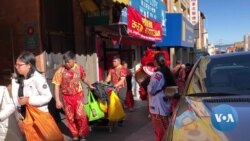George Chen, the chef and owner of a top Chinese restaurant in San Francisco, is closely watching the news about the coronavirus.
Business hasn’t been affected – yet. But Chen remembers how it did fall in 2003 during the severe acute respiratory syndrome (SARS) outbreak. It took awhile to come back.
"I've been trying to change perceptions of Chinese food,” said Chen, owner of China Live. “I don't want something like this to set us back.”
Fears of a backlash
As public health officials grapple with the coronavirus, some Chinese Americans worry that there will be a backlash against their community as fears of the illness may turn into fear of Chinese people.
For many in the Chinese American community here, nothing much has changed. Plans for the Lunar New Year parade, set for this Saturday, are going forward, even without a ballet troupe from China that couldn’t make it because of the travel ban. Some older residents were out shopping over the weekend wearing face masks. Residents say people wear masks out of a sense of precaution.
But for some Chinese Americans, the travel ban on people coming from China has stirred up memories of darker periods of U.S. history, such as the Chinese Exclusion Act of 1882 and stereotypes of Asian Americans.
Memes and jokes
"We're seeing a lot of very viral materials, whether those are videos or memes or jokes and things like that,” said Hoi Leung, curator of the Chinese Culture Center of San Francisco. “And I think it's still perpetuating stereotypes that that's been happening since the Chinese first came to America in (the) mid 1800s.”
A recent post from the University of California at Berkeley called xenophobia towards Asians “a normal reaction.” The university took down the post and apologized.
But many in the Chinese community were upset.
Hong Mei Pang, advocacy director of Chinese for Affirmative Action, which is in San Francisco’s Chinatown, stressed that the coronavirus is a health issue, and shouldn’t be associated with one ethnic group or another.
"We urge everybody to maintain the perspective that this is a public health issue and to not use it as a way to scapegoat or make sweeping generalizations on anybody, but also for institutions to remain accountable to all of their students, to the diverse populations and communities that live in California,” she said.
For Chen, the restaurateur, the public health concerns about the coronavirus are serious. But he doesn’t want a disease to be used to stereotype Chinese Americans and especially not Chinese cuisine.
"Disease is nothing to laugh at,” he said. “It has nothing to do with Chinese food.”





